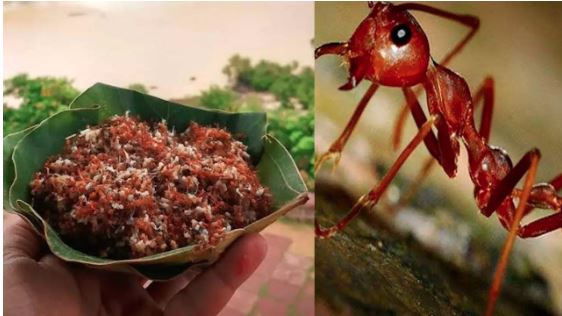Context
The Kai Chutney made from Red Ants by the tribals of Mayurbhanj district in Odisha are seeking a Geographical Indications (GI) tag.
About Ant Chutney
- People often keep a safe distance from red weaver ants as their sting inflicts a sharp pain and reddish bumps on the skin.
- Despite this, weaver ants are popular among the tribes of Mayurbhanj district in Odisha for the mouth-watering dish made of them — the Kai chutney.
- This food item, rich in proteins, calcium, zinc, vitamin B-12, iron, magnesium, potassium, sodium, copper, fibre and 18 amino acids, is known to boost the immune system and keep diseases at bay.

The species (Weaver ants)
- Red weaver ants are indigenous to Mayurbhanj and are found abundantly in the jungles there, including in Similipal.
- Weaver ants are scientifically called Oecophylla smaragdina.
- Red weaver ants live in colonies consisting of multiple nests on trees.
- Each nest is made of leaves stitched together using the silk produced by their larvae, and can withstand strong winds and can be water-tight.
- They assemble nests with leaves of host timber. When required, leafy nests of ants are plucked and collected in a bucket of water.
- Later they are sorted and separated from leaves and debris. Larval and adult stage ants are preferred for eating raw or into “chutney form”.
|
How is the Chutney prepared?
- Weaver ants, Oecophylla smaragdina, are abundantly found in Mayurbhanj throughout the year.
- They make nests with leaves of host trees.
- The chutney is prepared by mixing and grinding salt, ginger, garlic and chilly and is sold by tribal people in rural markets.
What is a GI Tag?
- A Geographical Indication (GI) is a sign used on products that have a specific geographical origin and possess qualities or a reputation that are due to that origin.
- In addition, the qualities, characteristics, or reputation of the product should be essentially due to the place of origin.
- A geographical indication right enables those who have the right to use the indication to prevent its use by a third party whose product does not conform to the applicable standards.
- For a product to function with a GI, a sign must be there on it to ensure its identification. No one other than the registered and authorized users is to use the product’s name.
GI tag in India
- Geographical Indications of Goods (Registration & Protection) Act, 1999 governs the GI tag in India.
- It is issued by the Geographical Indications Registry (Chennai).
- Geographical indications registered as collective and certification marks are generally protected for renewable ten-year periods.
- Products Covered: Agricultural products, foodstuffs, wine and spirit drinks, handicrafts, and industrial products.
- Applied under the food category, the GI tag will help develop a structured hygiene protocol in the preparation of Kai chutney for standard wider use.
- Geographical Indications labels enhance the reputation and value of local products and support local businesses.

|
